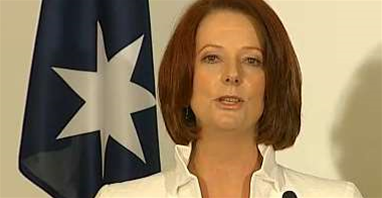The organisation building the National Broadband Network will restart spending, tenders and recruitment following news of the installation of a Labor minority government today.

Four of the five Green and independent MPs backed Labor, with Tony Windsor and Rob Oakeshott saying Labor's broadband policy was critical to their decisions.
With the Coalition vowing to scrap the NBN should it come to power, its architect NBN Co was operating at limited capacity during the past few weeks.
NBN Co welcomed Windsor and Oakeshott's announcements today, which finally gave Labor the 76 seats required to form government.
"NBN Co's management and its 300 employees welcome the clarity that today's announcements provides in relation to the future of the NBN," a NBN Co spokesman said.
"We will now work to restore deferred processes, including the recruitment of staff.
"Everyone at NBN Co is looking forward to working with business, government, the community and our customers to deliver a high-speed broadband future for all Australians.
"NBN Co will meet with its shareholder ministers to discuss future policy directions."
New network directions
Regional Australia was a focus of the negotiations between the independents and the two major parties.
In the end, a deal between Labor and the independents saw agreements brokered on uniform national wholesale prices for the NBN and priority infrastructure rollout in regional areas rather than rolling out the network from metropolitan areas.
Prime Minister Julia Gillard confirmed the arrangements at a press conference.
She said wholesale tariffs would "end the difficulties with telecommunications, and difference in price for regional Australia", while skirting a question on whether metropolitan users would subsidise regional customers.
"What it means is that every Australian is going to be able to get access to the same wholesale price and competitive broadband," she said.
"What a transformation, to equalise telecommunications. What a transformation."
She described negotiations with the independent MPs and the Greens as "business-like" and "marked by openness, candour and diligence in working through the issues".
She said the Government would work through ministerial and cabinet changes "in coming days" with her leadership team, which included Communications Minister Stephen Conroy.
The Prime Minister urged Parliament to "draw back the curtains and let the sunshine [of parliamentary reform] shine in".
And she extended an olive branch to the Coalition in the belief that the "Australian people want us to find more common ground in the national interest".
"I pledge to work constructively with you and your colleagues to find common ground where we can," the Prime Minister said.
"I will always be working for this nation's future and I pledge that from me to the Australian people".
Coalition's broadband response
Opposition leader Tony Abbott said that "in the end [he] wasn't surprised or shocked" by the decision of the independent MPs but that he was disappointed.
"I was nevertheless grateful for the opportunity over the past fortnight to put my case to the independents," Abbott said.
He believed he had taken good policies into the election and lambasted the Government over its broadband network policy.
"My suspicion is that the NBN is going to be school halls on steroids," he said, referring to the cost blowout on the Building the Education Revolution scheme.
"I think it's going to be an absolute minefield of waste and incompetence and you can be absolutely certain the Opposition will be hypersensitive in this area.
"No competent government would commit $43 billion without a full cost-benefit analysis. The fact this Government has done so is a very bad sign for competent government."
Meanwhile, Nationals Senator Barnaby Joyce told ABC News24 that the Nationals did not want another election but were "bitterly disappointed" in the independents' decision.
Senator Joyce said Australia was heading for a "rolling fiasco" and predicted that Australians should expect the "nutty ideas to start rolling out" and the Greens "to pursue their agenda as is their wont, as is their right".
He slammed the national broadband network "which, for all intents and purposes, may be superseded by other technologies down the track".
"Broadband was a $46 billion commitment and even on that there's a tolerance of 25 percent that could go either way for a technology that could be superseded," Joyce said.
"Remember this money has to be borrowed. Are we going to be happy to ... put that on the nation's credit card?
"Although there might be a desire to put fibre into every house, are we going to accept [the funding arrangement]?"
He criticised the NBN for "not going to all Australians", believing the Coalition's policy "went to the edges [better]" to look after regional Australians.
Joyce also claimed the NBN would result in duplicating infrastructure in metropolitan areas and "tokenistic decisions made in regional areas".
The Greens' response
Greens communication spokesman, Senator Scott Ludlam, said Australia had reached a "good outcome" for its telecommunications landscape.
But the broadband debate was far from over. Senator Ludlam said that although there was clarity over the House of Representatives, the upper house would not be finalised until the middle of next year.
"Technically, the Senate is still hostile to the prospect of rolling broadband bills out. We'll be going into negotiations the Coalition and [Family First Senator] Steve Fielding."
He noted the NBN was "one of the areas where there was a clear distinction between the parties", with Labor committing up to $43 billion on a fibre-based network, and the Coalition planning to spend just over $6 billion.
"The issues we've been raising about privatisation and rolling it [the NBN] in rather than rolling it out got good coverage during the campaign," he said.


_(23).jpg&h=140&w=231&c=1&s=0)
.png&h=140&w=231&c=1&s=0)







 iTnews Executive Retreat - Security Leaders Edition
iTnews Executive Retreat - Security Leaders Edition
 iTnews Benchmark Awards 2026
iTnews Benchmark Awards 2026
 iTnews Cloud Covered Breakfast Summit
iTnews Cloud Covered Breakfast Summit
 The 2026 iAwards
The 2026 iAwards











_(1).jpg&h=140&w=231&c=1&s=0)



